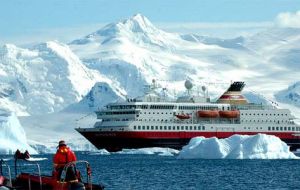MercoPress. South Atlantic News Agency
Tourism boom industry threatens Antarctica
 Last season 29.500 tourists visited the Antarctica
Last season 29.500 tourists visited the Antarctica A cruise ship takes on water in the Antarctic and three more come quickly to the rescue: A blessing for the survivors, to be sure. But also an indication of a tourism boom that critics say threatens Antarctica's environment and puts passengers at risk.
The 154 passengers and crew of the MS Explorer were all plucked safely from life rafts this weekend by a Norwegian cruise ship as their own vessel slid into the icy seas. Tourism in the world's southernmost continent has spiked in popularity, but there is little regulation of the lucrative industry. Now giant cruise ships have begun to arrive, and some experts fear catastrophic accidents and environmental damage. "Under the environmental protocol of the Antarctic Treaty Secretariat, the whole of Antarctica is supposed to be a reserve," said Jim Barnes, executive director of The Antarctic and Southern Ocean Coalition. "It's supposed to be dedicated to science and to protect the wilderness and the environment." In the 1992-93 season, about 6,700 tourists visited the Antarctic, according to the International Association of Antarctica Tour Operators. Last season, that had quadrupled to 29,500. Seven countries have made territorial claims in Antarctica, but nobody recognizes them. In some cases, countries claim the same piece of the continent. So it's rarely clear what authority is in charge. The Antarctic Treaty was signed in 1959 with the aim of preventing military incursions in Antarctica. Its members meet each year and adopt recommendations, but there is no single authority to enforce them. This has left the Antarctic tourism industry largely self-regulated. The International Association of Antarctica Tour Operators was founded by seven companies with the goal of promoting "safe and environmentally responsible" travel. The group now has 99 members, but there are tour groups working outside the association which may not follow its safety and environmental guidelines. "Because of management principles that (the association) has put in place, we've managed environmental impact," said Denise Landau, the association's executive director. "The concern is that companies outside the membership are not playing with the rest of the operators." Toronto-based G.A.P. Adventures, the owner of the Explorer, is an association member. Passengers paid as much as $14,000 for a suite on board the vessel during the 19-day cruise. The ship was a relatively small 246 feet, with a double hull billed by the company as "a go-anywhere ship for the go-anywhere traveler." But the Antarctic's blinding sleet, fog, high winds and treacherous seas - even in the October-to-April summer when cruise ships flock to the area by the dozens - make sailing treacherous for even the most rugged vessel. "If a ship like that can go down, it really should be a wake-up call about allowing vessels that are not ice-strengthened and do not have double hulls to go down there at all," Barnes said. The Golden Princess, a 689-foot cruise ship that cam carry 2,425 passengers, sailed Antarctic waters this season, but passengers did not set foot on the Antarctic and there were no incidents. A paper presented at the Antarctic Treaty's last meeting called the Golden Princess, run by California-based Princess Cruises, the largest tourist vessel ever to operate in Antarctic water. The paper recommended treaty members bar large cruise ships, but they have not done so. Princess Cruises spokeswoman Julie Benson said the company has scheduled four more cruises, two in 2008 and two in 2009, aboard the Star Princess, a ship the same size as the Golden Princess. Benson acknowledged the cruise line does not use ice-strengthened ships in the region, but said it operates under the Antarctic Treaty system. "We don't believe that (ice-strengthening) is necessary because we cruise in the summer months when it's relatively ice-free, and our ships transit only in open-water areas with very limited ice floes," Benson said. (AP)




Top Comments
Disclaimer & comment rulesCommenting for this story is now closed.
If you have a Facebook account, become a fan and comment on our Facebook Page!